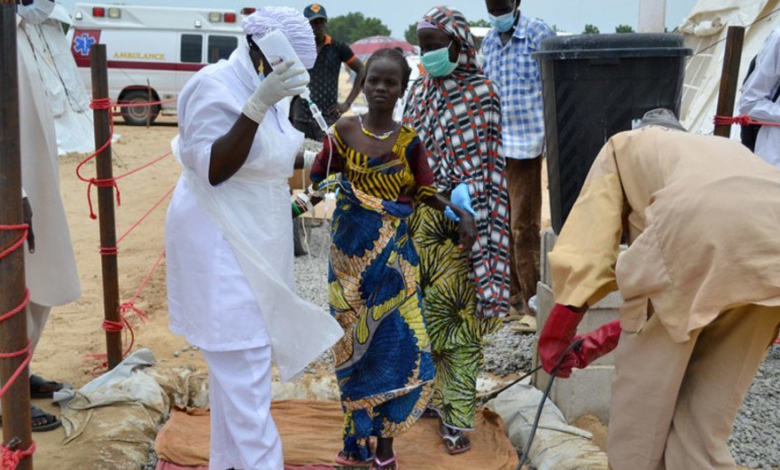Nigeria’s 2021 Cholera Outbreak Deadly In Recent Times – WHO
Walter Mulombo, WHO Country Representative in Nigeria challenged Nigeria to seize all opportunities for vaccination in specific target areas with zero doses and ensure that often-missed children were offered OCV and all routine vaccinations.

The World Health Organisation (WHO) says Nigeria recorded more than 100,000 suspected cases of cholera in 2021, the highest number in recent times.
Walter Mulombo, WHO Country Representative in Nigeria said the figures were confirmed at a training session on oral cholera vaccine request and campaign planning organised by the Global Task Force on Cholera Control (GTFCC).
In 2021, Médecins Sans Frontières(MSF)/Doctors Without Borders, an international NGO was working alongside the Nigerian Ministry of Health to bring the spiralling cholera outbreak under control in Bauchi State, Northeast Nigeria.
Towards the end of 2021, MSF revealed that Bauchi State recorded the highest cases of cholera due to little access to Water Sanitation and Hygiene (WASH) components, and slow effective rollout of vaccination to these affected communities.
However, to curb the spread, MSF adopted a community-based approach, taking health care, hygiene measures, and public health information directly to the affected communities. Isolation camps and oral rehydration points were also set up.
Speaking on Monday, April 25, Mulombo said the GTFCC offers countries the capacity, tools, and assistance to develop National Cholera Plans (NCPs) and implement them effectively.
He explained that the agency had proved to be effective in the development of National Control Plans, which included vaccination and Water, Sanitation and Hygiene (WASH) activities especially in endemic countries.
“These include reactive vaccination with more than 1.7 million persons vaccinated with two doses each of Oral Cholera Vaccination (OCV) in Bauchi, Jigawa, Yobe, and Zamfara states,” he said of the activities of GTFCC in Nigeria to combat cholera.
He added that the recently approved GTFCC application for Nigeria will help mitigate the risk and upsurge of cholera cases during this rainy season.
“The application covers approximately nine million doses of OCV to implement two campaigns in 14 local government areas in nine states and the FCT,’’ Mulombo said.
Nigeria, he said, had demonstrated the capacity to implement vaccinations in difficult settings like insecurity and inaccessible roads, as experienced in two local government areas in Zamfara State.
Through the use of handheld mobile phones, Molumbo noted that the country had also addressed and improved vaccination data quality.
“We believe that the vast experience built in Nigeria over the years in implementing mass vaccination campaigns will come to bear as we prepare for the next preventive campaigns,” he said.
The WHO representative challenged Nigeria to seize all opportunities for vaccination in specific target areas with zero doses and ensure that often-missed children were offered OCV and all routine vaccinations.
This, he said, was necessary so that the country would meet the global target of ending cholera by 2030.
A possible cholera comeback
The Nigeria Centre for Disease Control (NCDC) has said in its epidemiological trends that no fewer than 701 suspected cases of cholera and 19 deaths have been reported so far as of Monday, April 4, 2022.
“Twelve states have reported suspected cholera cases in 2022. They are Abia, Adamawa, Bauchi, Bayelsa, Borno, Cross River, Kwara, Lagos, Nasarawa, Rivers, Taraba and Zamfara. As of Sunday, Feb. 27, a total of 701 suspected cases, including 19 deaths, have been reported from 12 states in 2022,” NCDC revealed.
According to a report, Nigeria has almost 14 million people who live in cholera hotspots where environmental, cultural, and socioeconomic conditions facilitate the transmission of the disease and cholera persists or reappears regularly.
The report found that two-thirds of Nigerians use drinking water supplies contaminated by thermotolerant coliforms—bacteria often used to measure fecal pollution—and about a quarter of the population practises open defecation.
“Basic water amenities do not exist in most lower and middle-income countries. Although the economy of Nigeria is the largest in Africa, inequality is significant,” the report reads.
The report equally mentioned that, environmental health is the weakest component of the health system in Nigeria and requires investment to develop the capacity to monitor the living conditions and environmental hygiene of the rapidly growing population of Nigeria.
Support Our Journalism
There are millions of ordinary people affected by conflict in Africa whose stories are missing in the mainstream media. HumAngle is determined to tell those challenging and under-reported stories, hoping that the people impacted by these conflicts will find the safety and security they deserve.
To ensure that we continue to provide public service coverage, we have a small favour to ask you. We want you to be part of our journalistic endeavour by contributing a token to us.
Your donation will further promote a robust, free, and independent media.
Donate HereStay Closer To The Stories That Matter




